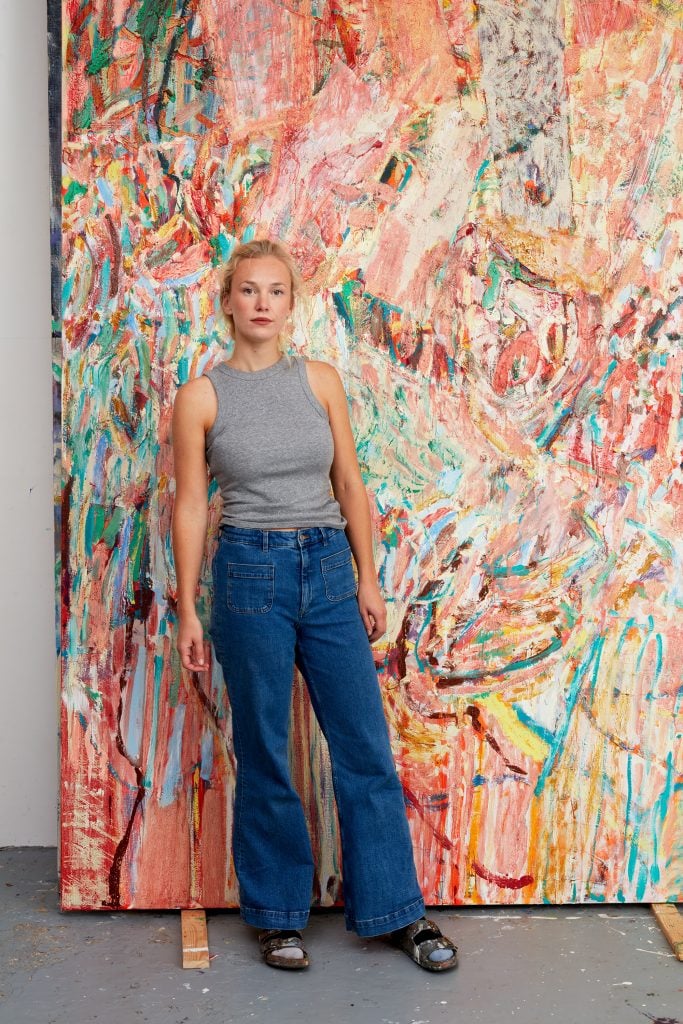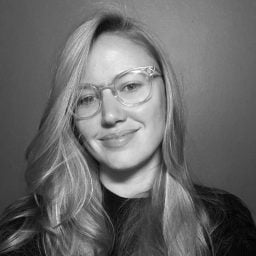Pam Evelyn’s mercurial paintings shift and warp the longer they are looked at. Colors that dominated at first glance gradually sink into the background; sweeping gestures fall away to reveal hidden layers. The British artist has described her work as being full of frustration. Her large-scale paintings evoke a hot bubbling over of emotion, but Evelyn connects this more with the process of making a painting – and the exasperation that entails – than a direct communication of her psychology. She is decidedly a painter’s painter, fascinated by the act and history of applying color to canvas.
“There is an undeniable emotional entanglement, but I’m interested in transcending a personal or political state,” the artist told Artnet News ahead of “A Handful of Dust” (on view through September 30), her first solo exhibition with Pace in London. “The paintings are slippery. That idea of them not being stationary and having new things come out is important. With my work, something can be very minimal and be just as finished as something completely overwhelmed with emotion.”
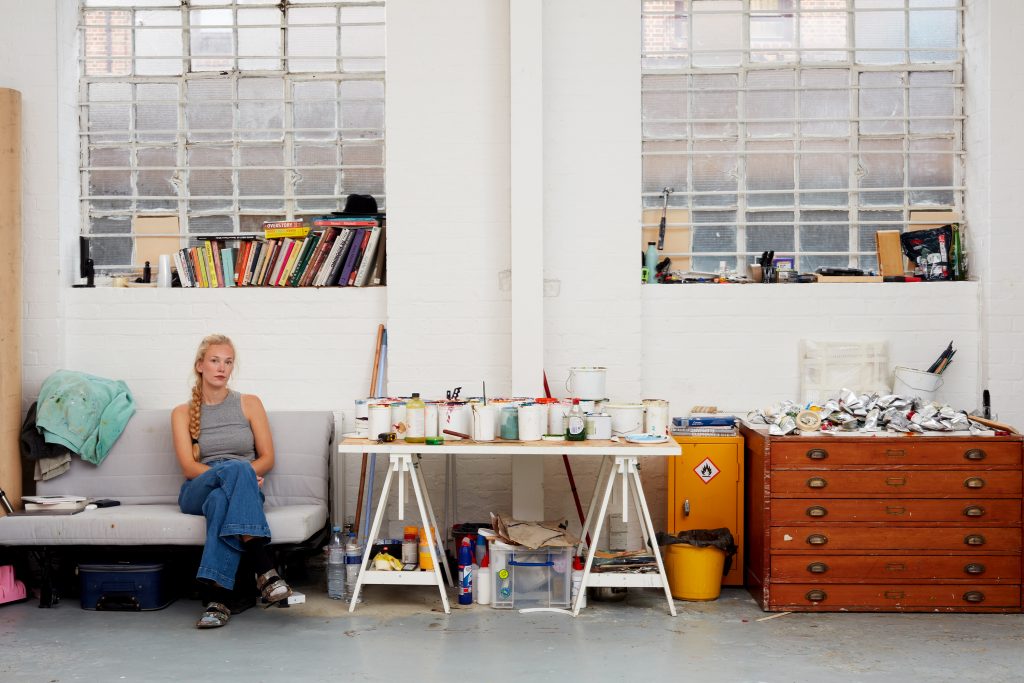
Portrait of Pam Evelyn, 2023, photo by Robert Glowacki © Pam Evelyn. Courtesy Pace Gallery.
Pace announced representation of Evelyn this past summer. Her career so far has been in sharp ascent. She graduated from the Royal College of Art in 2022 and has recently been shown in Whitechapel’s major group survey “Action, Gesture, Paint Women Artists and Global Abstraction 1940–1970″—for which she was invited to make two new works—as well as group shows on abstract painting at Vancouver’s Centre for International Contemporary Art and Warwick Arts Centre in the UK.
Evelyn’s name is often brought up in conjunction with other flourishing abstract painters, such as Jadé Fadojutimi and Rachel Jones. Her work has rapidly been picked up by the market too, with the 2020 painting Evening Rain vastly exceeding its 2022 Phillips auction estimation of $9,788 to $14,682, drawing a final bid of just over $100,000. The same year, time spent in Cornwall offered a welcome moment to focus purely on making work. She took part in a residency at Portmeor Studios in Newlyn, finding inspiration in the changing winds and seas of Britain’s coastline.
“I knew it was really important for me to do,” she said. “There’s a really routed community around painting around Newlyn. Everyone I spoke to seemed to have an artist in their family. I went there to detach. I didn’t have any deadlines. At the time I just needed space. It made me more aware of what it is to be an observer.”
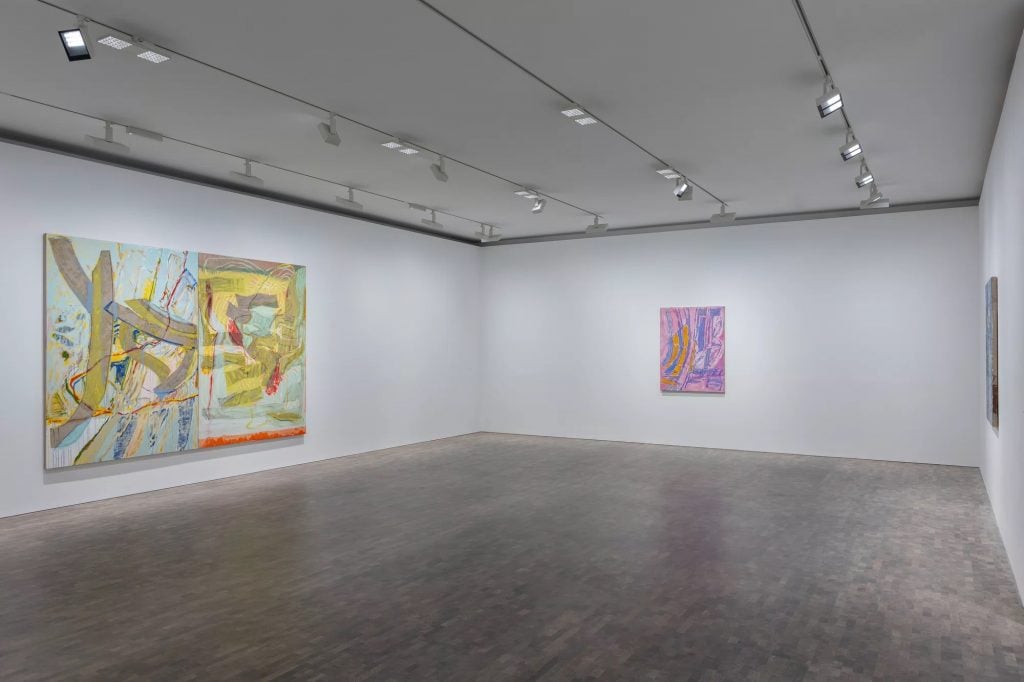
Installation view “Pam Evelyn: A Handful of Dust” at Pace London, 2023. Courtesy of Pace.
The temporary move from London to Cornwall offered an intriguing comparison between two working moods, which has since influenced the paintings, which are now on view at Pace. “I got to Cornwall and realized it’s much better to be in the unknowing state of mind,” she said. “That was uncomfortable, but the works really enjoy that state and show it. I did go into this romantic zone down there using these technical old-fashioned methods and that idea of being very sensitively attuned to the shifts in the daylight. Coming back to London, it was as though everything closed in on itself again, which can be quite intense; it’s harder to detach and let go here. Painting is very much an escape for me, especially when I’m in London. Maybe sometimes an avoidance. But in that, the paintings can get exciting too.”
Evelyn is fascinated by mark-making. When Artnet visited her East London studio, she pulled out a Matthew Wong book to highlight a particular pencil mark that has had a resounding impact on her. “It’s seeing a sensitivity in a mark that I’d like to see manifest in future works,” she said. The artist also spoke about a pencil line in Matisse’s Memory of Oceania which she thought about while painting Hidden Scene for “A Handful of Dust.” It is less the subject matter of artists who have gone before that excites her, and more their specific material and gestural choices.
“This one pencil line in Memory of Oceania is completely sharp and it’s just one mark,” she said. “To expose a moment like that in a painting that you’d usually want to conceal is amazing. Hidden Scene is very much about exposing the nature of the first touch, the first unedited mark, the significance of the drawn line, and how much it holds in terms of vulnerability and strength, which is not something I usually allow out.”
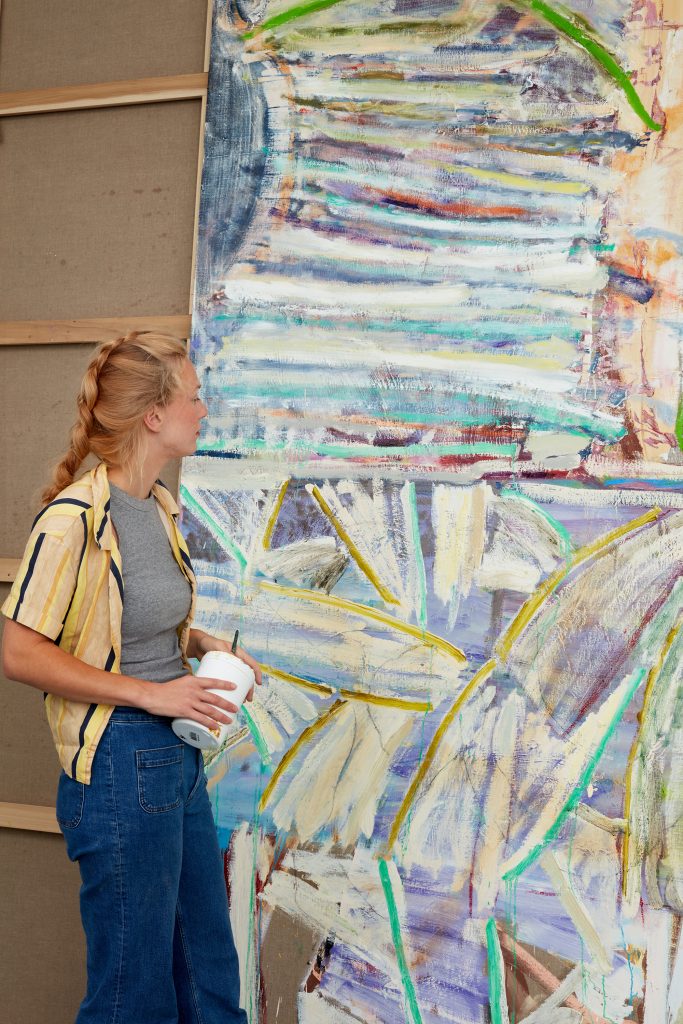
Pam Evelyn, 2023, photo by Robert Glowacki © Pam Evelyn. Courtesy Pace Gallery.
Hunting for freedom in her work, the artist often tries to “trip myself up”, sometimes rotating the canvas to avoid weighting the composition. The paintings take around six months to complete, and she likes to have a few weeks away from them before exhibiting so she can see them in a new light. “In one sense I’m obsessed with the mark and I try and understand its very nature,” she said. “But it’s not about being skilled. That can also be a bit of a trap. Trying to be clever about it. If it falls into that then you’re just showing off. When I get to something too concrete it feels less interesting than a painting that has lots of loose ends. My whole mentality about ‘A Handful of Dust’ was to not box myself in.”
For Evelyn, it is the constant search that compels her to keep working, far more than finding a tidy resolution. While she does not go so far as to pin down the paintings as an analogy for life, there is a deeply psychological aspect that draws parallels with the act of existence, in which we desperately search for a safe certainty that is hard to grasp. In Evelyn’s work, solid footing is out of reach, exposing a chaotic world that lies beyond the artist’s and viewer’s control. “My language has always been very loose,” she considered. “But the term abstraction is an unusual one, being that it’s reliant on reality. I feel like sometimes abstraction can be more cutting and real. It’s looking at the backbone.”
